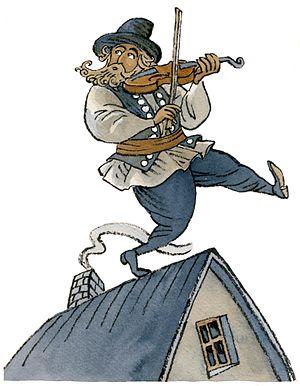
Although I’ve not seen it in years, Fiddler on the Roof is one of my favorite shows/movies. I’ve watched the movie numerous times and seen the performance live as a musical theatre production at least twice.
The scenes that have found place in my memory are what I call the “other hand scenes”. These are scenes where Tevya, a hardworking, ebullient, loving father and husband is talking to himself and to God. He is trying to make sense of the changing world around him and his value of tradition, yet also trying to figure out where tradition is not merely tradition but something far greater, something that cannot be compromised. The ‘other hand’ scenes are great pictures of a dialogue between a man fully comfortable communicating with his God.
We learn early on the value of tradition for Tevya:
”But in our little village of Anatevka, every one of us is a fiddler on the roof trying to scratch out a pleasant, simple tune without breaking his neck. It isn’t easy. You may ask, why do we stay here if it’s so dangerous? We stay because Anatevka is our home. And how do we keep our balance? That I can tell you in one word: Tradition!”
“Because of our traditions, we have kept our balance for many, many years. Here in Anatevka, we have traditions for everything: how to how to eat, how to sleep, how to wear clothes. For instance, we always keep our heads covered, and always wear a little prayer-shawl. This shows our constant devotion to God. You may ask, how did this tradition start? I’ll tell you. I don’t know. But it’s a tradition. And because of our traditions, every one of us knows who he is, and what God expects him to do.”
“Traditions, traditions. Without our traditions, our lives would be as shaky as… as… as a fiddler on the roof!”
The ‘other hand’ scenes come as Tevya watches his daughters, one by one, fall in love and want to marry. First his challenge is that his oldest daughter wants to marry a poor tailor, but ‘on the other hand he’s an honest hard worker’. We watch him process and ultimately compromise tradition, giving his blessing on the marriage. We see a similar pattern with his second daughter and feel his pain as she heads off on a train to Siberia to be with the man she loves.
But there comes a point where Tevya won’t compromise. Where in his own words “there is no other hand”.
I think a lot about this, about compromise, about what I am and am not willing to compromise. Communicating across cultural boundaries is a lot about give and take, a lot about compromise, a lot about negotiation. And when we communicate across truth claims and faith differences make no mistake — we are communicating across cultural differences, we are communicating across boundaries.
We live in an age where many are quick to criticize dogmatic truth claims. One of our friends who does a lot with interfaith dialogue says that there are times when you shake your head in disbelief because those who get together for interfaith dialogue water down their truth claims so much that they all sound the same.
That’s not dialogue. That’s monologue
When a Christian says that it doesn’t matter if Jesus is an allegory, and a Muslim says that the creed is unimportant then it’s not an interfaith dialogue – both have given up essential elements of their faith.
There are other times where people clearly and graciously state their claims, and, even if it bothers you, they won’t back down. There is no other hand. They will listen, and ask questions, and have genuine interest, but their faith compels them to hold fast to certain truth.
When it comes to tradition, belief, and truth claims I feel a lot like Tevya. I have this running dialogue with God, trying to sort out where and when I am willing to compromise and when I realize there is no other hand. Because if I bend that far, I’ll break.
“On the other hand, how can I turn my back on my faith, my people? If I try and bend that far, I’ll break. On the other hand… No. There is no other hand.”
What about you? Have you struggled to work through faith, what you will compromise, and what you won’t? I invite you to join the conversation – we need your voice.

